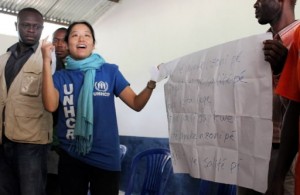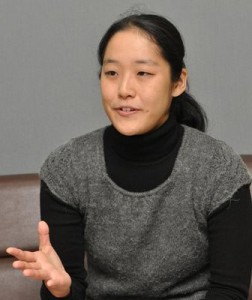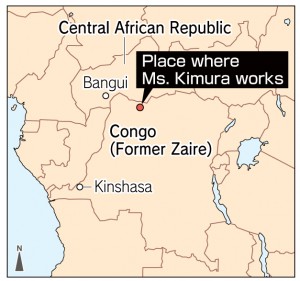Junior writers interview UNHCR staff member Makiha Kimura: Addressing conflicts involving refugees
Jan. 22, 2016
Refugees fleeing from the long-running civil war in Syria and from other countries, and flocking to EU nations, have drawn the world’s attention. In Africa, too, refugees are crossing borders to escape from armed conflict and human rights abuses, a serious concern. Junior writers from the Chugoku Shimbun interviewed Makiha Kimura, 28, a graduate of Funairi High School in Naka Ward, Hiroshima. Ms. Kimura has been serving in the northern part of Congo as a staff member of the Office of the United Nations High Commissioner for Refugees (UNHCR). Taking advantage of her temporary return to Japan, the junior writers asked about the conditions in Congo and her perspective on the world. (Hiromi Ueoka, 15, and Riho Kito, 14)
What causes people to become displaced and end up as refugees?
In the Central African Republic, one of Congo’s neighbors, there has been continuous fighting between the government and anti-government forces since the nation’s independence from France in 1960. Over the years more and more people have evacuated. When Congo decided to take in refugees from the Central African Republic, they flocked to Congo’s northern border area. But as their stay grew longer, conflict broke out with the local residents in Congo over the limited materials and resources. To help address this, UNHCR began its operation there in 2013.
My work involves intervening in conflicts between refugees and residents, or conflicts among the refugees, and trying to resolve these situations. For instance, because they have no access to electricity or gas, there are tensions between the refugees and the local residents over securing enough firewood for cooking. I have asked them to discuss this and come to a solution so that the amount of firewood they’re cutting can be limited in order to preserve resources in the area.
What do you give the most attention to in your work?
I make sure each issue is taken very seriously. I sometimes want to make excuses for being unable to find a solution to a problem. But I try to think very hard and resolve the issues as much as I can.
Because Congo has a male-dominated culture, it’s difficult for women to speak up in a meeting. We’re therefore trying to involve women in discussion by forming groups by gender, for example.
What are the challenges of your work?
It’s true that the experiences of the refugees, who have fled for their lives, are very moving. But it’s also the case that they become accustomed to “being given” things while staying in a refugee camp. When I asked them to clean up the camp site, for example, they asked if they would be getting something in return. So I made up new lyrics to the song “Twinkle Twinkle Little Star” and sung it to convey the idea that unsanitary conditions aren’t good for them and their waste should be gathered up and dumped. Finally, they took action and started cleaning up. I think the problem of refugees coming to rely on receiving aid is a weak point of humanitarian support and this is a large challenge for us.
How did you become interested in this type of work?
When I was in high school, I started to take an interest in international activities and I dreamed of working for the United Nations. Because I was born and raised in Hiroshima, and learned about the importance of building a peaceful world, I was determined to make a contribution toward this through my work. That’s why I’m able to endure the difficult working conditions.
To some degree, armed clashes and conflicts can be prevented through the wisdom and efforts of human beings. However, once these problems occur, they result in great damage and it takes significant time and energy to overcome them. So we have to do our best so these problems won’t happen in the first place.
However, to people who are from places that have been devastated by conflict, I always tell them, “Hiroshima was completely destroyed by the atomic bomb, but the people were able to rebuild the city and prosper once again. So let’s work together to make that happen.” I believe Hiroshima’s rebirth can be a source of hope for others.
(Originally published on January 18, 2016)
What causes people to become displaced and end up as refugees?
In the Central African Republic, one of Congo’s neighbors, there has been continuous fighting between the government and anti-government forces since the nation’s independence from France in 1960. Over the years more and more people have evacuated. When Congo decided to take in refugees from the Central African Republic, they flocked to Congo’s northern border area. But as their stay grew longer, conflict broke out with the local residents in Congo over the limited materials and resources. To help address this, UNHCR began its operation there in 2013.
My work involves intervening in conflicts between refugees and residents, or conflicts among the refugees, and trying to resolve these situations. For instance, because they have no access to electricity or gas, there are tensions between the refugees and the local residents over securing enough firewood for cooking. I have asked them to discuss this and come to a solution so that the amount of firewood they’re cutting can be limited in order to preserve resources in the area.
What do you give the most attention to in your work?
I make sure each issue is taken very seriously. I sometimes want to make excuses for being unable to find a solution to a problem. But I try to think very hard and resolve the issues as much as I can.
Because Congo has a male-dominated culture, it’s difficult for women to speak up in a meeting. We’re therefore trying to involve women in discussion by forming groups by gender, for example.
What are the challenges of your work?
It’s true that the experiences of the refugees, who have fled for their lives, are very moving. But it’s also the case that they become accustomed to “being given” things while staying in a refugee camp. When I asked them to clean up the camp site, for example, they asked if they would be getting something in return. So I made up new lyrics to the song “Twinkle Twinkle Little Star” and sung it to convey the idea that unsanitary conditions aren’t good for them and their waste should be gathered up and dumped. Finally, they took action and started cleaning up. I think the problem of refugees coming to rely on receiving aid is a weak point of humanitarian support and this is a large challenge for us.
How did you become interested in this type of work?
When I was in high school, I started to take an interest in international activities and I dreamed of working for the United Nations. Because I was born and raised in Hiroshima, and learned about the importance of building a peaceful world, I was determined to make a contribution toward this through my work. That’s why I’m able to endure the difficult working conditions.
To some degree, armed clashes and conflicts can be prevented through the wisdom and efforts of human beings. However, once these problems occur, they result in great damage and it takes significant time and energy to overcome them. So we have to do our best so these problems won’t happen in the first place.
However, to people who are from places that have been devastated by conflict, I always tell them, “Hiroshima was completely destroyed by the atomic bomb, but the people were able to rebuild the city and prosper once again. So let’s work together to make that happen.” I believe Hiroshima’s rebirth can be a source of hope for others.
(Originally published on January 18, 2016)










